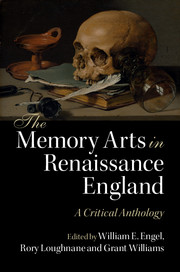Book contents
- Frontmatter
- Dedication
- Contents
- List of figures
- Acknowledgements
- A note on abbreviations
- Introduction
- PART I The art of memory
- PART II Rhetoric and poetics
- Introduction to Part II
- II.1 Anon., Table of Cebes (1531)
- II.2 Thomas Wilson, The Art of Rhetoric (1553)
- II.3 George Puttenham, The Art of English Poesy (1589)
- II.4 Henry Peacham, The Garden of Eloquence (1593)
- II.5 Philip Sidney, The Defence of Poesy (1595)
- II.6 Francis Meres, Palladis tamia (1598)
- II.7 Samuel Daniel, Musophilus (1599)
- II.8 Miles Sandys, Prudence (1634)
- II.9 Ben Jonson, Timber, or, Discoveries (1641)
- II.10 Alexander Ross, Mystagogus poeticus (1648)
- PART III Education and science
- PART IV History and philosophy
- PART V Religion and devotion
- PART VI Literature
- Index
- References
II.10 - Alexander Ross, Mystagogus poeticus (1648)
from PART II - Rhetoric and poetics
Published online by Cambridge University Press: 05 August 2016
- Frontmatter
- Dedication
- Contents
- List of figures
- Acknowledgements
- A note on abbreviations
- Introduction
- PART I The art of memory
- PART II Rhetoric and poetics
- Introduction to Part II
- II.1 Anon., Table of Cebes (1531)
- II.2 Thomas Wilson, The Art of Rhetoric (1553)
- II.3 George Puttenham, The Art of English Poesy (1589)
- II.4 Henry Peacham, The Garden of Eloquence (1593)
- II.5 Philip Sidney, The Defence of Poesy (1595)
- II.6 Francis Meres, Palladis tamia (1598)
- II.7 Samuel Daniel, Musophilus (1599)
- II.8 Miles Sandys, Prudence (1634)
- II.9 Ben Jonson, Timber, or, Discoveries (1641)
- II.10 Alexander Ross, Mystagogus poeticus (1648)
- PART III Education and science
- PART IV History and philosophy
- PART V Religion and devotion
- PART VI Literature
- Index
- References
Summary
About the author
Alexander Ross (1591–1654), patronised by Laud and chaplain to King James, wrote on biblical chronology and classical languages (including a Latin grammar in hexameter as an aid to memory). He defended Aristotle against Copernican views, quarrelling in print with among others Digby, Browne, Harvey and Hobbes.
About the text
Ross's Mel Heliconium: or Poetical Honey Gathered out of the Weeds of Parnassus (1642) was the basis for Mystagogus poeticus (1647), the first dictionary of mythology in English and the only such handbook arranged alphabetically. Ross prepared a second, enlarged edition almost immediately (1648), followed by four subsequent editions with double the number of entries and margin notes, making it more useful to university students than were the continental mythographies.
The arts of memory
Despite the apparent orderly presentation of etymologies and fables in each chapter, the interpretations proliferate, as if extemporaneously; Ross frequently interjects comments about princes, prelates and scholars. The classical figure under investigation serves as a background memory image upon which Ross fixes a range of salient points, made all the more memorable for his engaging exposition. This is a useful book not only for its mythological lore, but also as an extended lesson in how to read, organise and make sense of the world by using mnemonic techniques.
Textual notes
Alexander Ross, Mystagogus poeticus, or The Muses Interpreter (London, 1648), V4r–V6v.
Mystagogus poeticus
Musæ
The muses were the daughters of Jupiter and Mnemosyne; born in Pieria, they dwelt in Helicon, a hill of Bœotia and in Parnassus, a hill in Phocis, not far from Aonia; hence they were called Aonides. They were at first three, then seven, at last nine: Apollo was their guide, and the three Graces their attendants.[…]
The Interpreter
1. Osiris the Egyptian god (thought to be the same with Apollo) delighted much in music, but chiefly in the songs and playing of the nine virgins which for this cause he entertained: therefore they were called by the Greeks, muses.
- Type
- Chapter
- Information
- The Memory Arts in Renaissance EnglandA Critical Anthology, pp. 138 - 140Publisher: Cambridge University PressPrint publication year: 2016



